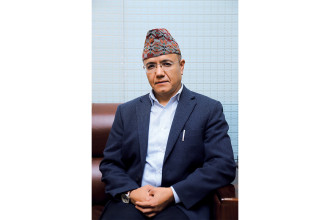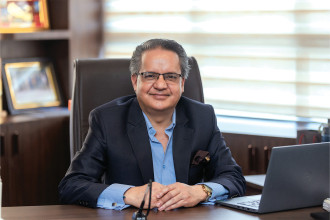
Bibek Bijukchhe believes solely in the hard-earned experience to turn the ordinary into the extraordinary. Standing tall in the industry, Bijukchhe holds more than a decade experience as the Chief Executive Officer at Pooja International, Vishal Group Automotive Division. Pooja International, a subsidiary of Vishal Group is the authorised importer of Volkswagen marquee vehicles in Nepal.
In an interview with Business 360, he shares his thoughts on leadership. Excerpts:.
What is your definition of leadership?
I had read an article which talked about the differentiating factors between a manager and a leader through a very interesting example. It went like this: ‘In the Amazon forest where apparently it takes at least ten minutes for water to reach the ground, there are a number of tall trees. Here the manager looks for a goal and eventually decides to climb a tree. Sometimes, when he reaches the top, he realises that he has climbed the wrong tree. But a leader is someone who chooses which tree to climb first. Once the right tree is selected, he takes his team along and ensures the output matches the effort spent on climbing the tree and further guides them in the right direction’. In other words, leaders are meant to lead organisations, define and set goals with a clear vision.
Also, it’s very challenging to be a leader and the first and foremost requirement of a leader is to be able to perform and become a role model for others. People should follow only those leaders who can set an example by doing.
Whose leadership skills you admire the most?
A leader poses a number of qualities and considering those, I admire the Indian Prime Minister Narendra Modi, most of all. He is taking India to new levels and his vision is quite clear.
How do you encourage creative thinking within your organisation?
The first and foremost requirement to generate creativity is to create an environment where people can speak for themselves. Unfortunately, in major countries, people choose to work because they require it, irrespective of the fact that they may or may not like it which leads to a lot of misplacements. So, when somebody wants to be a pilot but he is in an accounting profession then there is no way that he will be able to channelise creative thinking. In my case, whenever I feel that somebody is underperforming, I try to assess what work is of real interest to him and what work he is put into. I believe the right job for the right person is the key to creativity and the way to greater potential.
How do you keep your employees and team members keen and motivated?
Nobody can motive anyone; it is only one’s willpower which can. There are good and bad times in any organisation. When the leader is honest, compassionate and understands his team members, then motivation comes on its own.
Are there any fundamental differences between a male and a female leader?
Yes, there is. Well, it is inherited in the genes. When you talk about risk taking, male leaders are more aggressive. They can take more risks. And when you talk about female leaders, they promote stability. Normally, during the regime of male leaders, the ups and downs are high, and during the guidance of female leadership, fixed outputs are expected.
What are the keys to developing the next generation of leaders?
The education system in Nepal needs to be changed. The curriculum here needs a desperate revision with a higher focus on practical knowledge and training from industry veterans. The highlight should be deviated from mugging up textbooks to understanding them via more fieldwork.
What are you doing to ensure that you continue to grow and develop as a leader?
It is a very stressful job because you have to outperform yourself every single day. But the market is dynamic and frankly speaking, whenever I get some time, I stream videos on YouTube which talk about failures and means to overcome them. There are a lot of case studies and with this information, you learn and upgrade yourself. Also, avoiding the mistakes that other people have committed is true learning.
How should a CEO handle a crisis in the organisation?
It depends on the type of crisis altogether. But the main crisis that we face in the context of Nepal is that we have very limited qualified people in almost all sectors. And the turnover of staff in any organisation is another crisis where people learn for years and eventually leave.
The mindset of people is that they don’t want to develop people rather they want to hire people who are already developed. The best way to avoid this type of crisis is to create a win-win situation for customers, employees and employers.
Which Volkswagen model encompasses everything that you personally seek in an automobile?
All the companies develop cars considering factors like age and income of a person. The car model keeps on changing as the person grows. Considering my phase of life, I believe Volkswagen Passat would be an aspiring choice.
Do you think academic institutions can teach a person how to become a leader?
It is a much-debated question, whether a leader is inborn trait or acquired attribute. For instance, business leaders in the world like Bill Gates, Steve Jobs, Fred Smith do not have formal education in running a business. And the reason behind their success is that they knew what they want in life and they believed they could bring about change. On the other hand, educational institutes produce clerks who do not want to experiment with new things.




-(1)-1752214965.jpg)